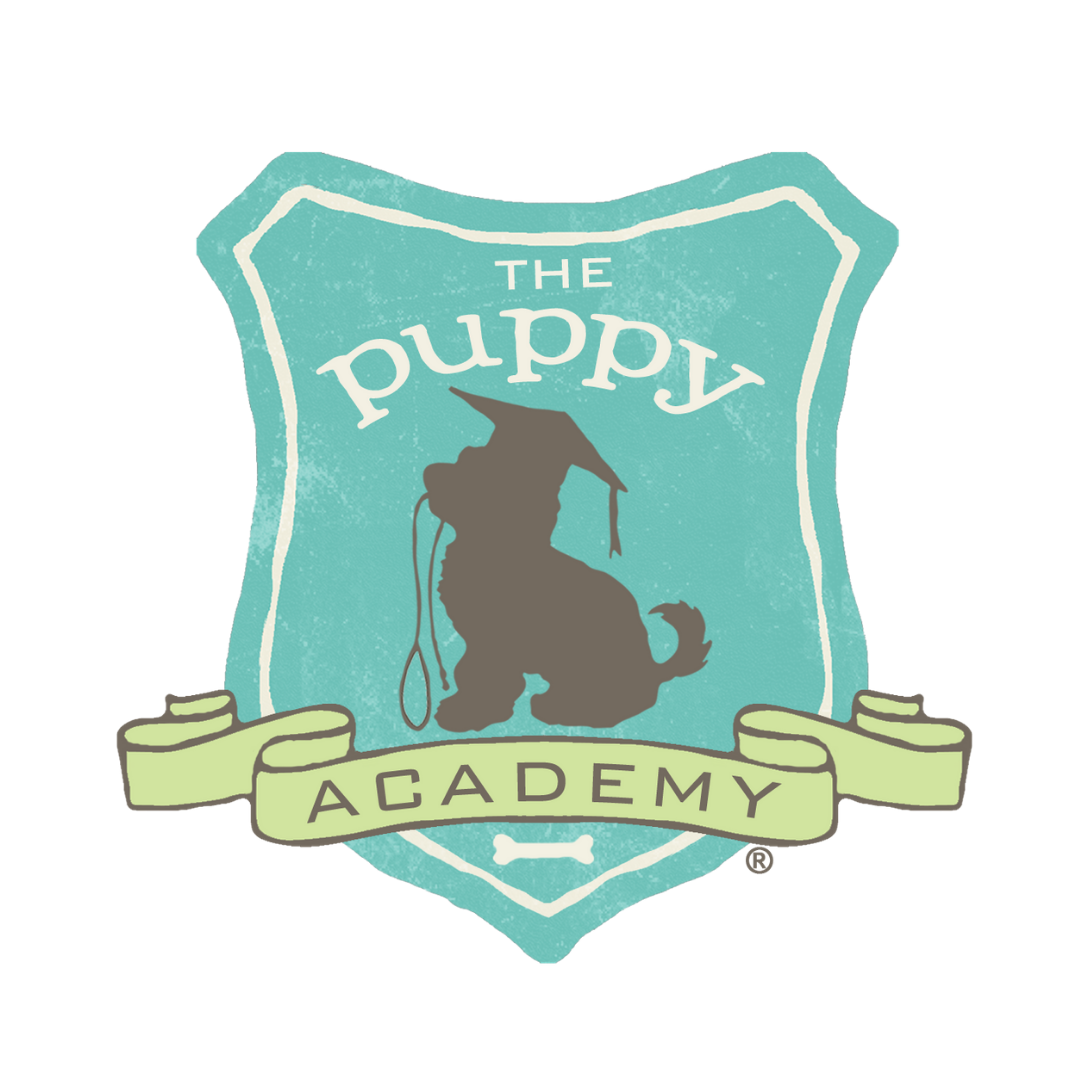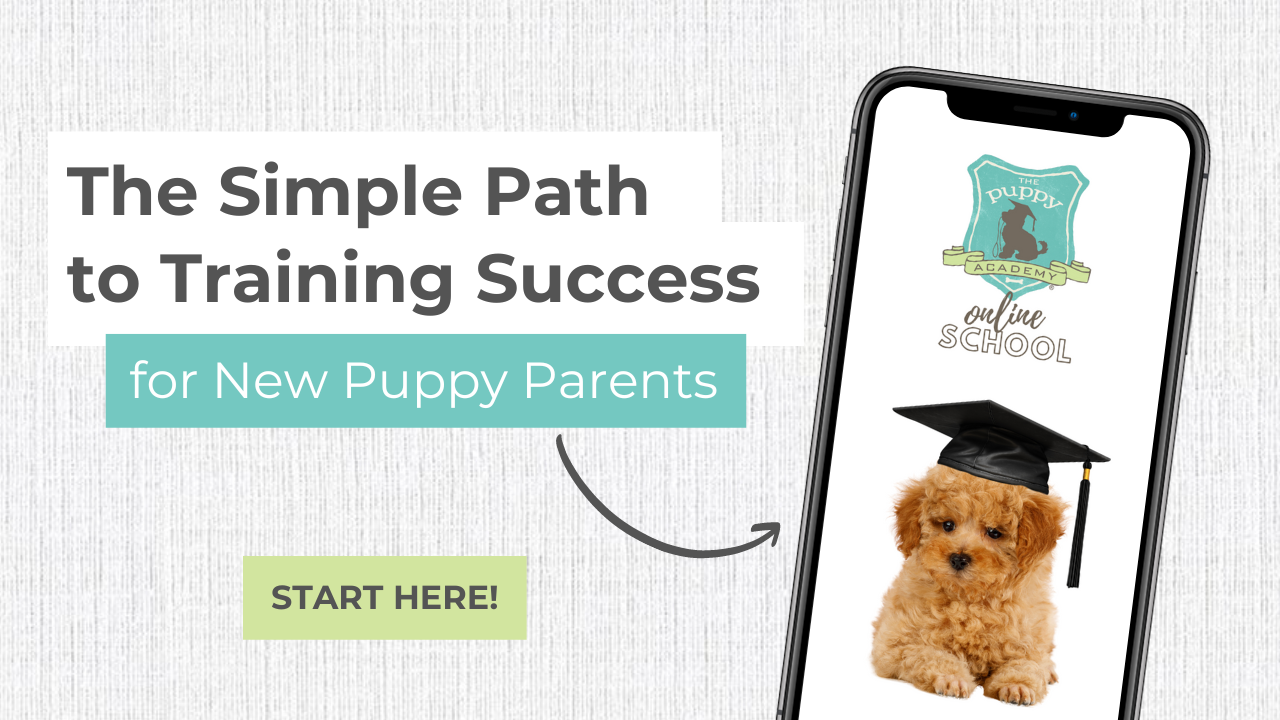There’s nothing quite as exciting as getting a puppy, especially if you’ve been hoping for one or planning to get one over the holidays! But now comes the question: “What do I need to do first?” Here’s what you need to know and do in the first 30 days with your new puppy!
The Puppy Academy student, Hayes!
What to Expect the First 30 Days
The holidays have come and gone…all year long you were dreaming about your very own puppy and now you have one! That first month is going to be full of excitement — and plenty of potty accidents! Your puppy will be learning the ropes of their new home relatively quickly, while you’ll be learning how to establish routines, house boundaries, providing necessary wellness care, training, and overall introducing your puppy to their new life to help them get off to the best start possible.
Even if you knew you were bringing home a puppy already, puppy-proofed your home, and went shopping for the essentials, there’s probably some things you didn’t know about that you weren’t prepared for. And if you’re a new pup parent who suddenly found themselves with a new four-legged best friend and need to play a little catch-up, we’ll get you up to speed on what you need to know!
The First Day Home
It’s the start of a beautiful journey with your pup! That first day will be overwhelming in the best ways for both of you! As this will most likely be the first day your puppy will be away from their mother, littermates, and breeder, or their rescue or shelter, everything will be new and exciting! Every puppy reacts differently to their new home. Some will be eager to sniff and explore, while others may be timider. Both are normal reactions as your puppy begins to settle in. Give them time to adjust, supervise them as they sniff around their new home (you might even want to leave a leash attached to them), and start to use their name when you interact with them!
Don’t worry if you brought your puppy home and weren’t 100% prepared! Take the opportunity to use your pup’s first day home and the first week to get them organized if needed. In our blog, “What to Buy for Your New Puppy!” we cover everything from the basic supplies and beyond. Focus on the essentials: healthy puppy food that satisfies the needs of their breed type, food and water bowls, a crate, and bed, chew toys, grooming tools, and cleaning supplies.
Puppy-proof your home, if you didn’t beforehand, as soon as possible to avoid the chance of your puppy accidentally getting into something they shouldn’t. Go through each room of your home that they might have access to with a fine-tooth comb. Puppies are very curious so expect that anything at their mouth level is an easy target! Cables, electronics, cleaning supplies, shoes and clothing, trash bins -- these are some of the most common household items that pups love to get into and chew!
Lastly, for your pup’s first day, give them a space of their own! You can easily do this by setting up a crate and playpen so they can begin to establish that this area is where they can go to sleep, hang out, and eat all while keeping them in a safe area where they can’t get into trouble! Get our guide for how to crate train your puppy here!
The Puppy Academy student, Gunny!
Your First 7 Days Together
Take some time to research a veterinarian in your area that you plan to bring your puppy for their first wellness visit and beyond. Don’t put off this crucially important step in your pup’s first week home! Whether or not you expected to bring home your new puppy, they’ll need a wellness checkup within those first few days to make sure they’re growing healthy and strong.
During your first visit, you’ll want to talk to your veterinarian about establishing a vaccination schedule, their growth stages, when to start socializing and walking them, planning their spay or neuter, etc. It’s one of the most important visits as it sets the stage for your pup’s future healthcare maintenance, so coming prepared with the right questions is key! We go into all the details of what to prepare and ask in our “What to Ask Your Vet on Your Puppy’s First Visit!” blog!
At home, you can start working on setting boundaries for your puppy to help them learn what is expected of them. Crates and playpens are vital tools that can help with this as they create a physical boundary where your pup can have their own space. But boundaries go beyond your home. Think of them as the rules of conduct for the home and eventually in public. To start, ask yourself: Do you want your pup on the furniture with you or prefer them to relax in a spot of their own? And how about when you take them outdoors or in social settings. Do you want them to walk beside you and follow your lead? Do you wish them to remain calm while greeting new people and in new environments? Once you establish what you expect from your pup, you’re laying the groundwork for teaching them life-long good manners!
Puppies thrive from consistency because, much like how setting boundaries helps teach pups what’s expected of them, introducing a puppy schedule helps them learn their new life and routines! This is possibly one of the most useful techniques new puppy parents can use to their advantage to help their puppy get on track fast, and learn important life skills like how to settle down and how to hold their potty! From feeding to nap time, a puppy schedule that incorporates each aspect of their day. Match your own family’s schedule as closely as possible to start getting your pup used to your routine vs. having their own separate one. Need help creating a puppy schedule? Follow our steps here to set one up for yourself or to use our sample puppy schedule to get started!
Once you’ve created a puppy schedule, stick to it to help teach your puppy when to go potty and where. For a full potty training plan, jump into our Free Potty Training Masterclass here:
The Next Couple of Weeks
After your puppy has spent a couple of weeks at home, getting the hang of the routines, and gotten their initial round of shots, you don’t want to waste any time with beginning puppy training! Finding a puppy trainer will take a little research and knowing what your specific goals are. At The Puppy Academy, many of our students start in-person classes as early as ten weeks old!
When’s the time to start training? Immediately! Setting your puppy up with the right structure and guidelines will encourage good habits form day one, and save you a ton of time and hassle from getting your puppy to unlearn all the not-so-good habits they pick up as they grow without the right guidance and training in place.
If you’re already ready to dive into a full program that lays out everything for you so you can simply follow it, dive right into our Online School! It will guide you on exactly what to do, how to do it and when to do everything with your new pup, right from your own home, on your own time. Plus you’ll get interact with our same trainers to ask your puppy questions for personal help. For more info check out The Puppy Academy Online School.
30 Days Have Passed...Now What?
Roughly after your pup’s first thirty days at home, they’ve gotten quite a bit under their belt: learning their boundaries at home, potty training, a daily puppy schedule, vet visits -- that’s a lot for a small puppy! And it only continues from there! Once your puppy has received their required vaccinations (check in with your vet about this) it’s time to get your puppy socializing if you haven't yet!
Socialization is a large part of your puppy’s ongoing puppy training. It expands beyond meeting new puppies, dogs, and people to new places, environments and sounds. During this phase, your puppy should experience things that they will encounter on a daily basis. Car horns, doorbells, baby sounds -- the list can go on! Slow introductions that won’t overwhelm your puppy’s natural tolerance thresholds plus consistent practice with these experiences will help shape your pup into a well-rounded and confident adult dog!
Start socialization as soon as is safe for your puppy, and remember it’s the quality of the interactions that matter, not the quantity! So be mindful of the places, people and other pups they are being exposed to.
Training your puppy doesn’t stop after the first 30 days with them, it continues for weeks (and months, and even years!) beyond. For a full outline of what to teach your puppy and when, visit our “Complete Puppy Training Schedule By Age” blog that breaks it all down for you!
Bringing home a new puppy is always an exciting time, regardless if it’s over the holidays, expected or not! New puppy parent overwhelm is real and preparing for your puppy’s arrival can help you be ready for the journey ahead. But not everyone’s journey starts with a clear cut path and that’s totally okay too! Take the time to get your pup settled in at home, and follow these steps to create a game plan for your pup’s wellness and puppy training. By following the tips we covered and being patient with yourself and your puppy, you can feel confident that you are providing the best possible start to your pup’s life with you!
Have more questions about a puppy training schedule for your puppy? Ask our trainers LIVE every Wednesday at 1 pm PT on our Instagram @thepuppyacademy during our Ask A Puppy Trainer Show! All replays are posted afterward, and you can catch up on our last ones on our YouTube channel!
Become a Puppy Academy VIP (Very Important Puppy) to get our latest puppy training tips direct to your inbox, for free, each week!
Looking for the perfect present for the new puppy parent in your life? (Yes, that’s YOU too!) Document all those special puppyhood moments with our official Puppy Memory Book!:
Check out these blogs related to puppy training and more!
Introducing Your Puppy to the Family Dog!







